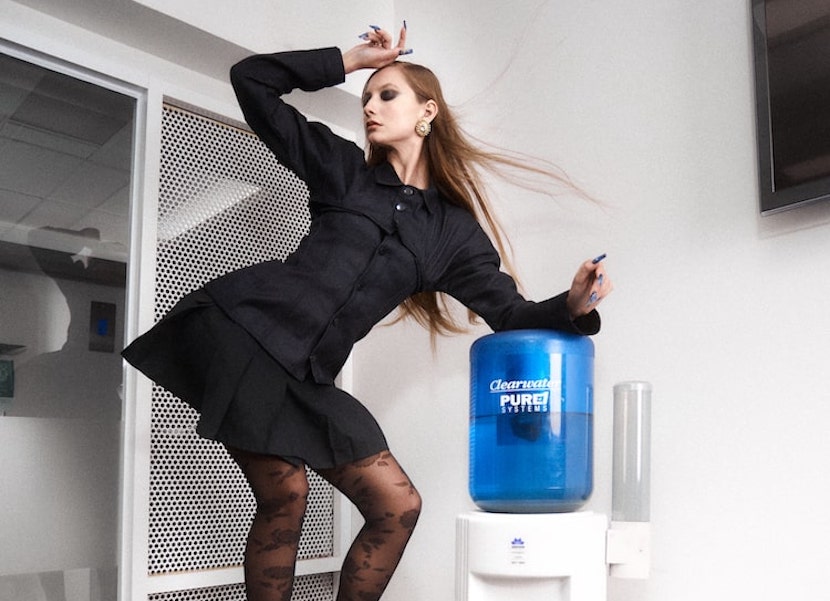Is it ever a good idea to sleep with a coworker?
Photography by Ella Maximillion
Words by Eleanor Wilson
Because you can’t ghost a work colleague.
It’s the movie plot that hurtled Bridget Jones’ Diary to cult-classic status, but the ebb and flow of emotions that arise from sleeping with a coworker aren’t restricted to fictitious film sets.
In the eyes of some people, it’s a part of life and a right of passage. If I had a dollar for every time I acted on a work crush… well, being a heterosexual woman working in a female-dominated industry, I can’t say I’d be living on lobsters and caviar. But that’s not to say many others don’t have a wealth of romantic workplace interactions under their belts.
Looking for more career-related content? Head to our Life section.
But even aficionados of an office rendezvous can struggle to navigate the post-sex debrief. To make up for my inexperience in professional hook-ups, I decided to ask Christina Kioulafas, a relationship counsellor who’s guided her fair share of diverse relationships to communicative bliss.
Why do we sleep with our colleagues?
As products of a capitalist society, we’re programmed to hold great value in our careers. During regular business hours, we wouldn’t dare so much as ask for a phone number for fear of jeopardising our shiny job titles. So why is it that, when Friday rolls around and we’re unwinding with colleagues over a jug of ambiguous tap beer, we push our shrewd inhibitions aside?
Of course, the ill-fated beer goggles may play a role but according to Christina, the ‘mystery’ of a colleague is an endearing factor with respect to workplace sex. “We tend to only see one side of people, the powerful, productive, warm, professional side which can be very appealing. It’s also appealing to be attracted to someone and want to see their softer or sexier side, there is some mystery there,” she explains.
Similarly, relationship expert Nancy Carbone says sometimes workplace attraction can be built on ‘fantasy’. “What happens is [workers] will form an emotional bond, or what I call a ‘fantasy relationship’, with someone they aren’t close with at work, as they feel they can be themselves and be more open,” she reveals.
“[Sometimes] it’s actually the fantasy of what they’ve conjured up in their head about the person that creates the illusion of a close connection.”
So what happens when we do?
As Monday morning comes around after a weekend of anxiety-induced torment, we tend to revert to a primitive ‘fight or flight decision’ when it comes to addressing the situation. Some of us will face the embarrassment head-on, by marching to the photocopier and blurting out a nervous jumble of “Can we just pretend Friday never happened?”.
Others will take the flight route, glue their eyes to the carpet and their headphones to their ears, avoiding any prospect of a post-sex debrief. According to Christina, no matter how frivolous the interaction is, addressing a work hook-up is vital if you want to avoid awkward or inappropriate work mishaps.
“Like with any intimate relationship, you should respect the person and yourself by letting them know where you stand. So yes, addressing the hook-up briefly will help to make clear what each other’s expectations are,” she says.
And, she says, addressing a hook-up doesn’t have to be as daunting as the aforementioned parade to the photocopier. “Even a brief text, where you don’t have to deal with the face-to-face awkwardness, can go far in clearing the air,” she suggests. “Respect yourself and your colleague, as well as the workplace team. Be honest, but keep it short and sweet.”
What if I feel a strong connection with a colleague?
Of course, a tipsy one-night stand isn’t the only type of workplace relationship to ever occur. Maybe you’ve shared several nights of passion and are trying to gauge whether the butterflies you’re feeling are reciprocated.
“Plenty of people meet at work and have long and fruitful relationships,” Christina says. But if you do find yourself in a relationship with a coworker, boundaries and communication need to become paramount.
“Talk openly about how you want things to be so you are both on the same page. Set time away from each other to maintain your independence and identity as individuals,” she offers. And when it comes to the touchy subject of company promotions, Christina says the same communication rules apply.
“Talk about it, be open about any feelings of jealousy or disappointment. Your partner’s success is important for you both,” she explains.
Should communication change when there’s a power structure in place?
Maybe, like Bridget Jones, it was your boss who you did the deed with, leaving you feeling extra confused and a little bit weird about where you stand. In the case of sleeping with one of your superiors, Christina says expectations, respect, and consent are key.
“If you sleep with your boss, you need to reflect on the power dynamic in the relationship and both of you need to be clear on consent and what is appropriate,” she tells me. “Workplace sexual harassment is a serious issue and happens all the time, often going on unreported for fear of losing one’s job. So yes, communication is SO important … If you are not sure, ask.”
No matter the fine print of your workplace fling, Christina says reflecting on the underlying reasons behind your relationships is incredibly important to maintain a healthy work/life balance.
“If [sleeping with colleagues] is a recurring pattern, it can be harmful. It’s best to ask yourself ‘Why am I doing this? Is it to fulfil a desire? Loneliness? Boredom?’,” she notes. “Always leave time for reflection and think about it. If you continue to hurt them or be hurt, [it’s] probably best to reflect and take a break”.
There’s no doubt sex between two consenting adults is one of life’s primary joys. But sometimes it’s best to say your drunken goodbyes in time to make the last train and save the prospect of love and sex for situations where the stakes aren’t quite as high.
This article was originally published on July 23, 2021.
For tips on what to consider before you sleep with a colleague, head here.













